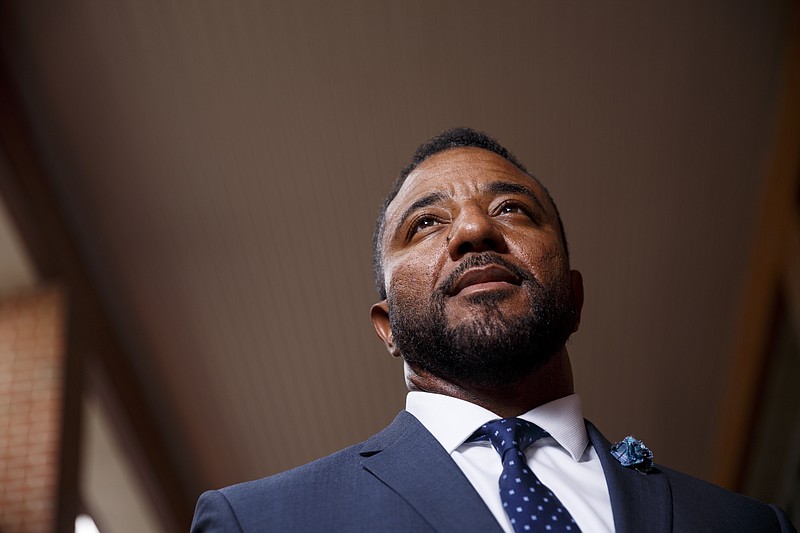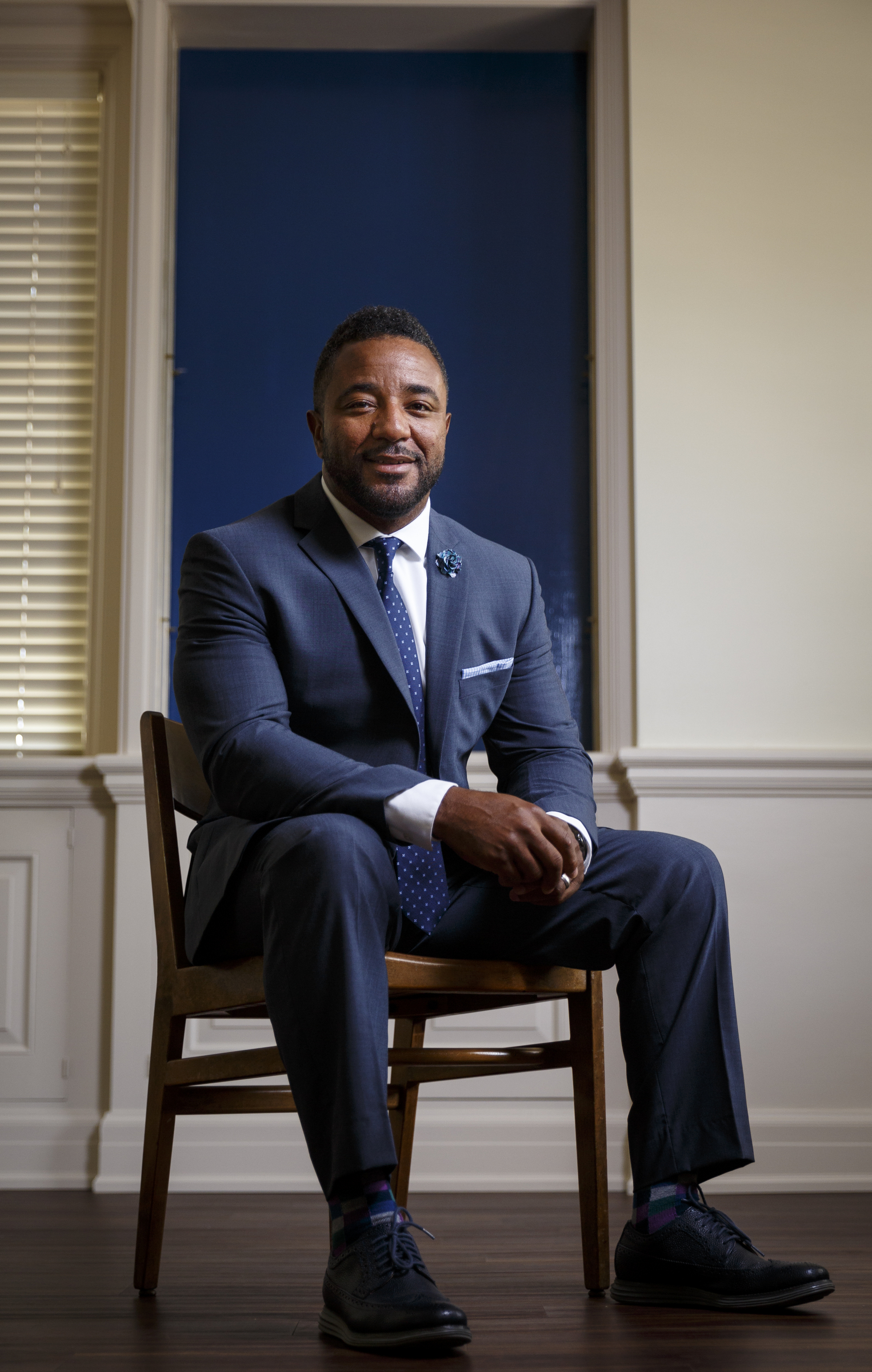By the numbers
* Boys score as well as or better than girls on standardized tests.* Boys receive up to 70 percent of the D’s and F’s given to all students.* Three out of four learning-disabled students are boys.* Boys create 90 percent of classroom discipline problems.* Eighty percent all high school dropouts are boys.* In the Boston Public Schools graduating class of 2007, there were 191 black girls for every 100 black boys going on to attend a four-year college or university. Among Hispanics, the ratio was 175 girls for every 100 boys; among whites, 153 for every 100.Sources: Christina Hoff Sommers, “The Boys at the Back” an opinion piece in The New York Times. Michael Gurian, “The Minds of Boys: Saving Our Sons from Falling Behind in School and in Life.”
More Info
Online: understandingboys.org/page and on Twitter @Center4Boys
Looking at Chattanooga, Troy Kemp sees division.
"Chattanooga is full of rivals," he said, naming race, socio-economic status and the schools children attend as barriers separating people.
"We have to cross these lines," said Kemp, the newly named director of the National Center for the Development of Boys.
For two decades, Kemp has worked at McCallie School, but now he's leaving his position at the all-boy private college-prep school and stepping into a new role working to increase opportunities for all boys.
Last year, McCallie announced plans to establish the center, which is dedicated to the educational development of boys in Hamilton County and across the country.
Lee Burns, headmaster at McCallie, said a national search was conducted to find the center's leader, but Kemp's experience teaching, coaching and advising boys as an associate headmaster at McCallie, coupled with his personal background, prepared him well to take the helm.
The nonprofit center will be based at McCallie on the slopes of Missionary Ridge, but will have its own board of directors and funding. Burns said he sees the center using the 900-student campus as a laboratory to study how to best prepare boys.
Specifically, Burns, who will be the center's first board chairman, sees the organization as a way the private school can help meet a public need.
"We talk a lot about duty at McCallie," Burns said. "We have a duty to help others. And looking across our community and the nation, we see boys are struggling."
He said solving the problems facing Chattanooga's youth requires different people and groups raising their hands and offering to help.
"McCallie is stepping up and saying, 'We are wanting to be involved,'" he said.
Kemp said the center's purpose is to help build connections and provide support to those investing in boys' lives. He said the center will share research and resources, bring in speakers, host seminars and provide ongoing training to people working with boys.
The exact direction the center will go is evolving, but he is confident innovative approaches will take root in Chattanooga.
Paul Smith previously led the city's Violence Reduction Initiative and was the principal at The Howard School, and he said that for years he and other educators in Chattanooga have dreamed about what an all-boys public school could do to help move the dial for boys living in generational poverty. He said helping kids embrace and work toward a future takes people at the schools and in the neighborhoods expecting success from these students and being a safety net when things get tough.
"This has to be from the home to the school to the future, where we are all pushing the children in the same direction," he said.
Smith said students coming from poverty deserve equity, not just equality. He said schools need to focus on teaching reading, writing and arithmetic, but also provide the contextual knowledge many students don't get at home.
At the end of the day, helping kids succeed takes more than education, Smith said, adding schools need to show young black men what they can be by having people who look like them modeling it.
"These boys need mentorship," he said.
According to national figures, boys have lower grade-point averages than girls and are more likely to drop out, repeat grades and have disciplinary problems.
The lack of male leadership in homes also is a problem, Kemp said.
Only about one in 20 Hamilton County students attends an exceptional or high-performing school, according to local data, and black students are 33 times more likely than white students to attend the lowest-performing schools statewide.
Students in five local high schools have an average ACT score below 16, meaning these students do not meet even the minimum ACT requirement to enroll in technical school.
Recent waves of shootings also have people from city hall to the pulpit saying young men need to be given alternatives to gang violence.
Smith said when helping kids rise out of generations of poverty it's important to remember many are dealing with trauma.
"It's present traumatic stress disorder, and these kids are living in it every day and trying to reconcile what is happening to them," he said.
Smith, now the strategic operations and policy specialist at the National Network for Safe Communities located at Johns Jay College of Criminal Justice, said it's important for the entire community to take responsibility for the future of marginalized students.
"The problem is not setting the expectation too high we are setting the bar too low," he said.
This year in Hamilton County there has been a swell of attention placed on the work of Chattanooga 2.0, a local initiative working to galvanize community support around improving the county's public education and workforce development for all students. The group released a sobering report in December detailing the state of the county's schools and how most local graduates are not prepared to hold jobs that pay a living wage.
Business leaders and community members are now working on ways to provide all students with opportunity.
Kevin Adams, bishop at Olivet Baptist Church, said some students in Hamilton County are not given the same opportunities as others because of their ZIP codes and socio-economic status.
"Kids are starting off already behind, and the playing field never becomes fair," he said.
The obstacles limiting boys from opportunities are systemic, Adams said, cautioning that one group cannot provide the solution to the wide range of problems facing the city's poor and marginalized.
"I applaud the people for trying," Adams said. "But still more needs to be done."
For Kemp, the mentors he had growing up in a poor, single-parent migrant family in Long Island, N.Y., enabled him to break the cycle of poverty and earn an education.
"When I see my high school yearbook, I see the people incarcerated or the people no longer on this Earth because of the choices they made," Kemp said.
He hopes the center will help create change for boys on the other side of Dodds Avenue who don't attend McCallie.
"We help the boys in Chattanooga by making sure that people modeling and mentoring them are well informed and engaging them in the right way," he said. "That changes things. It changed me."
Contact staff writer Kendi Anderson at 423-757-6592 or kendi.anderson@timesfree press.com. Follow on twitter @kendi_and.

